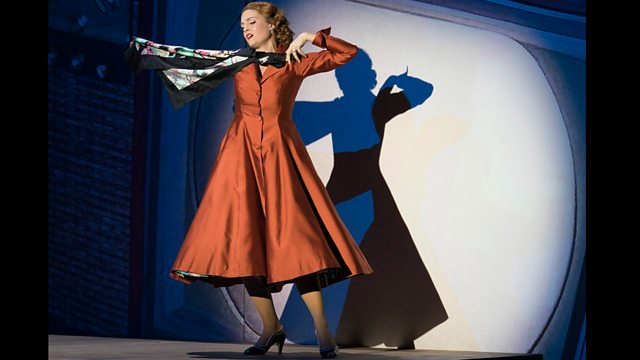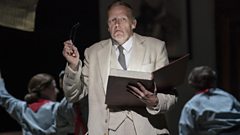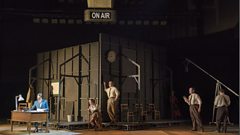
Opera North Double Bill: Osud & Trouble in Tahiti
Tom Redmond with two rarely performed short operas, Leos Janacek's 'Osud' and Leonard Bernstein's 'Trouble In Tahiti', given by Opera North under the banner 'Little Greats'.
Tom Redmond introduces, with expert Nigel Simeone, performances of two rarely performed short operas: Leos Janacek's semi-autobiographical "Osud" (Destiny) which the composer wrote in the first decade of the last century, and Leonard Bernstein's jazz inflected "Trouble In Tahiti" written in the 1950s as an observation on marriage in the age of consumerism. The two operas were recorded at the Grand Theatre in Leeds earlier in the year and were given by Opera North as part of a festival of compact opera under the banner "Little Greats".
Osud cast:
M铆la Valkov谩 ..... Giselle Allen (soprano)
沤ivn媒 ..... John Graham-Hall (tenor)
M铆la's Mother ..... Rosalind Plowright (soprano)
Dr. Suda ..... Peter Auty (tenor)
Lhotsk媒 ..... Richard Burkhard (baritone)
Kone膷n媒 ..... Dean Robinson (baritone)
Miss Stuhl谩 ..... Ann Taylor (mezzo-soprano)
Chorus and Orchestra of Opera North
conductor Martin Andr茅
Trouble in Tahiti cast:
Sam ..... Quirijn de Lang (baritone)
Dinah ..... Wallis Giunta (mezzo-soprano)
Swing Trio: Fflur Wyn (soprano), Joseph Shovelton (tenor), Nicholas Butterfield (bass)
Orchestra of Opera North
conductor Tobias Ringborg.
Last on
Clip
-
![]()
Director Annabel Arden on her conception of Jan谩膷ek's 'Osud'
Duration: 01:54
Music Played
-
![]()
Leos Jan谩膷ek
Osud
Singer: John Graham Hall. Singer: Giselle Allen. Singer: Rosalind Plowright. Choir: Opera North Chorus. Orchestra: Opera North Orchestra. Conductor: Martin Andr茅. -
![]()
Leonard Bernstein
Trouble in Tahiti
Singer: Quirijn de Lang. Singer: Wallis Giunta. Orchestra: Opera North Orchestra. Conductor: Tobias Ringborg. -
![]()
Leonard Bernstein
Chichester Psalms
Orchestra: Israel Philharmonic Orchestra. Conductor: Leonard Bernstein.- Bernstein: Chichester Psalms.
- DEUTSCHE GRAMMOPHON.
- 1-3.
-
![]()
Edvard Grieg
Homesickness (Lyric pieces - book 6 Op.57)
Performer: Leif Ove Andsnes.- Grieg: Lyric Pieces: Leif Ove Andsnes.
- EMI Classics.
Synopses
Osud
听
Act 1
M铆la and the composer 沤ivn媒 were once lovers but M铆la鈥檚 mother ended the relationship in hopes of a more advantageous match for her daughter. Alas, M铆la was already pregnant and is now a single mother, unlikely to marry anyone else. She and 沤ivn媒 meet again for the first time amid the amusements of a spa town. They sneak off together and rekindle their love, but her mother tracks them down in the crowd and predicts disaster.
Act 2
Four years later 沤ivn媒 and M铆la are married but her mother lives with them and has become mentally fragile. While their young son Doubek plays, the couple read through the unfinished opera 沤ivn媒 began during their separation. It is filled with bitterness against M铆la, portraying her as faithless. M铆la鈥檚 mother, losing her mind completely, repeats snatches of music from the opera before rushing to throw herself off a balcony. Attempting to restrain her mother, M铆la too is pulled over and both are killed.
Act 3
Eleven years later, 沤ivn媒鈥檚 opera is at last to be performed, although it remains unfinished. He rehearses a chorus from the opera with his students, among them Doubek, now a young man. Another student, Verva, guesses that the hero of the opera is the composer himself. Through the music, 沤ivn媒 again relives his love for M铆la and his cruelty to her. Tormented by regret, he asks Doubek to fetch a glass of water and then collapses. The end of the opera must remain in God鈥檚 hands.
听
Trouble in Tahiti
听
Prelude
A smiling jazz trio sings of perfect life in an affluent, unnamed suburban town, with its little white houses and happy, loving families. The town could be anywhere; many names are mentioned.
Scene I
Real life in suburbia contrasts greatly with what the Trio has painted. Sam and Dinah are having breakfast, alternating between habitual bickering and lyrical moments of longing for kindness. Dinah is angry with Sam. She accuses him of having an affair with his secretary, which he denies. She also reminds Sam that their son Junior's play is that afternoon but Sam insists that his handball tournament at the gym is more important. She needs more money to pay for her doctor, who Sam believes is a quack. He ignores her suggestion that he should see the doctor too. They agree that this is not the way to live and plan to talk things over that evening. They both ask the other for kindness and pray that the wall built up between them can be broken down. They continue to argue until Sam leaves for the office, late for his train.
Scene II
Sam, at work and exuding confidence, is dealing with business on the telephone. He turns down a Mr. Partridge, presumably for a loan; a move hailed as ingenious by the chorus. Sam is happy to offer a loan to the next caller, Bill, who is participating in the handball tournament with him. The chorus hails his big-hearted generosity.
Scene III
In her analyst's office, Dinah recalls a dream. Lost in an overgrown garden underneath a blackened sky, she heard two voices. First, she heard her father鈥檚 voice calling for her to come and then another, unknown, voice promising to lead her to a better and more peaceful garden.
Meanwhile, at his office, Sam asks his secretary if he has ever made a pass at her. When reminded of an incident he insists, in a menacing way, that it was an accident and that she should forget that it ever happened.
Scene IV
Sam and Dinah accidentally run into each other on the street. Rather than having lunch with each other, they both make up lies about imaginary commitments to lunch with others. They individually reflect on the confusing and painful course their relationship has taken, and yearn for the happiness they have lost.
Interlude
Inside the house, the Trio sings of lovely life in Suburbia, detailing the possessions that contribute to the American dream.
Scene V
At the gym, Sam has just won the handball tournament. He sings triumphantly about the nature of men; some try with all their might to rise to the top but never win while others, like him, are born winners and will always succeed.
Scene VI
In a hat shop, Dinah tells an unidentified person about a South Sea romance movie called "Trouble in Tahiti", which she has just spent the afternoon watching. At first she dismisses the movie as Technicolor drivel but as she recounts the story and its theme song "Island Magic," she gets caught up in the escapist fantasy of love. Suddenly self-conscious, she stops herself and returns home to prepare Sam鈥檚 dinner.
Scene VII
About to enter his home, Sam sings of another law of men: even the winner must pay "through the nose" for what he gets.
The Trio sings of imaginary evenings of domestic bliss in Suburbia: "bringing the loved ones together, safe by the warmth of the firelight". After dinner, Dinah is knitting and Sam is reading the paper. Sam decides the time has come for their talk and Dinah agrees. Sam finds that he doesn鈥檛 know how to begin talking. He blames Dinah for interruptions but she has not said anything and, eventually, he gives up. In the only听spoken dialogue听in the opera, Sam asks Dinah about Junior's play and discovers that they both missed it. He suggests they go to the movies to see a new film about Tahiti and Dinah consents. They leave, longing for quiet and communion and wondering if they can rediscover their love for one another. For now, they opt for the "bought-and-paid-for magic" of the silver screen. The Trio makes its final ironic comment, reprising the movie's "Island Magic" theme song.
Episode image (c) Alastair Muir
Broadcast
- Sat 30 Dec 2017 18:30麻豆社 Radio 3
Featured in...
![]()
More music on Radio 3—Radio 3 in Concert
We broadcast more live and specially-recorded concerts and opera than any other station.





